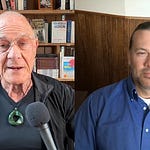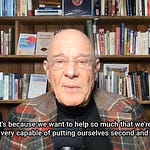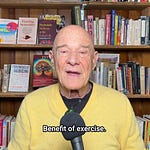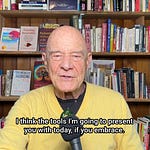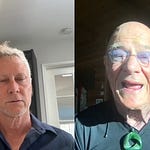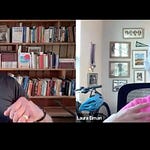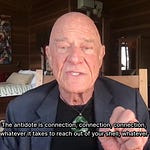Dear friends,
In our ongoing exploration of psychedelic science, we often focus on the carefully controlled clinical trials making headlines. But what about the other 99% of psychedelic experiences happening outside laboratory walls?
That's precisely the question driving the work of Dr. Matthew X. Lowe and Unlimited Sciences. Their groundbreaking research—including the world's largest naturalistic psilocybin study—reveals that self-guided psychedelic experiences can offer comparable benefits to clinical sessions for many individuals.
Most striking to me was their recent work with the queer community. As Dr. Lowe explained, this group has a particularly complex history with psychedelics—once used as "conversion therapy" tools in the 1950s and 60s, these same substances are now showing remarkable potential for healing shame, internalized homophobia, and improving self-acceptance.
This approach to psychedelic research—focusing on naturalistic, real-world use and centering historically marginalized voices—represents a vital shift in the field. It reminds us that as psychedelics move toward mainstream acceptance, we must ensure equitable access and culturally sensitive approaches for all communities.
Golden light,
Dr. Richard Louis Miller
Links & Resources
Full Article: "Shame, Guilt and Psychedelic Experience: Results from a Prospective, Longitudinal Survey of Real-World Psilocybin Use" - Published in the Journal of Psychoactive Drugs (February 2025)
Unlimited Sciences: Research organization studying observational/naturalistic psychedelic use
Psychedelic Info Line: Free consultation service - 888-210-3553
The Hidden 99%: What Real-World Psychedelic Use Teaches Us
xWhile carefully controlled clinical trials of psychedelics capture headlines, they represent just 1% of actual use. Dr. Matthew Lowe, Executive Director of Unlimited Sciences, is pioneering research into the other 99% - and what he's finding challenges many assumptions about how these medicines work outside laboratory settings.
The World's Largest Naturalistic Psilocybin Study
Working with Johns Hopkins University, Unlimited Sciences conceptualized and executed the largest IRB-approved study of longitudinal psilocybin use ever conducted. This groundbreaking collaboration enrolled over 8,000 individuals who documented their psilocybin experiences from 2020 to 2022.
The findings were remarkable:
Participants showed significant reductions in depression and anxiety
Benefits often matched those seen in clinical settings
Effects persisted for months after use
Changes extended beyond mental health to include personality traits like reduced neuroticism
"We found that a lot of people are using magic mushrooms at home on their own, and they were getting as strong benefits as we're seeing in clinical research," explains Dr. Lowe. This suggests that while clinical approaches are valuable, naturalistic settings may offer comparable benefits for many people.
The Complex Relationship with Shame and Guilt
One of the most intriguing aspects of this research involves psychedelics' impact on shame and guilt - emotional states that often underlie various mental health conditions. The data reveals:
68.2% of psilocybin users reported acute feelings of shame or guilt during their experience
The ability to work through these feelings predicted improved wellbeing 2-4 weeks after use
Overall small but significant decrease in trait shame maintained 2-3 months after use
However, it's important to note that trait shame actually increased in 29.8% of participants - an important reminder that psychedelics are not universally beneficial for everyone.
Creating Safe Spaces for Underrepresented Communities
Perhaps most significant is Unlimited Sciences' groundbreaking work with groups historically excluded from psychedelic research. Their study of queer individuals at an ayahuasca retreat in Costa Rica revealed profound healing potential:
Significant reductions in shame and internalized homophobia
Improvements in self-compassion and self-esteem
Persistent benefits in mental health and well-being
"The queer community has a really interesting background in psychedelic science," notes Dr. Lowe. "In the 1950s and 60s, psychedelics were being used in conversion therapy for homosexual individuals." This complex history makes the current healing potential all the more significant.
For many marginalized communities, shame appears to be a key mediator of negative health outcomes. Psychedelics' effectiveness at addressing shame and increasing self-acceptance potentially explains their broader therapeutic effects. This represents a shift from viewing psychedelics primarily as treatments for specific diagnoses toward understanding how they address underlying psychological mechanisms that contribute to various conditions.
The Case for Inclusive Research
The studies highlight a crucial point: psychedelic research must include diverse populations and settings to truly understand these substances' potential.
As Dr. Lowe emphasizes: "There are certain groups that tend to be overrepresented, such as Caucasian individuals in the world of research... It's incredibly important to look at different groups, look at underrepresented groups, and to focus on different communities."
His organization's findings with people of color further underscore this need: while they experienced similar acute benefits from psychedelics as white participants, these benefits were less likely to persist over time - suggesting that returning to environments with ongoing discrimination may erode therapeutic gains.
From Concept to Publication: A Research Pipeline
Since its founding in 2018, Unlimited Sciences has developed an impressive research pipeline. They've published four peer-reviewed papers from their psilocybin research, covering topics ranging from:
Mental health and wellbeing improvements from naturalistic use
Differential effects between white participants and participants of color
The relationship between shame, guilt, and psychedelic experiences
Effects on mind perception and beliefs
This growing body of evidence provides crucial data for understanding how psychedelics function in real-world settings, outside the constraints of clinical protocols.
Moving Forward: Education, Not Just Regulation
Given that 99% of psychedelic use occurs outside clinical settings, Dr. Lowe advocates for a harm reduction approach focused on education rather than solely pursuing medical models.
"We should be focused on the community," he argues. "And the first step to that is naturalistic research and educational initiatives."
Unlimited Sciences offers a free Psychedelic Info Line (888-210-3553) where people can speak with experienced coaches about psychedelics - an important resource as public interest grows but formal services remain limited.
As psychedelics continue their mainstream emergence, these findings remind us that we need approaches that serve not just those with access to expensive clinical programs, but the full spectrum of people who might benefit from these remarkable substances.
Now Available: Psychedelic Medicine at the End of Life
You can now order my latest book, Psychedelic Medicine at the End of Life: Dying Without Fear. This work represents a culmination of my decades-long journey as a clinical psychologist, exploring how psychedelics can transform our approach to death and dying.
The book examines how substances like LSD, MDMA, and psilocybin can be powerful tools in confronting our fears of mortality, ultimately leading to richer, more fulfilling lives. I'm honored to include insights from renowned experts in the field, as well as my own experiences.
Here's what some esteemed colleagues are saying:
James Fadiman, Ph.D., calls it "a deeply uplifting, clear, and compassionate guide to dying and how psychedelics, used correctly, diminish our fears about approaching the door that opens at the end of our life."
Charles S. Grob, M.D., describes it as "a masterful overview of an area of vital importance to our modern world... a valuable resource and contribution to the growing field of psychedelic medicine."
Julie Holland, M.D., notes that "Psychedelics may offer a mini-death rehearsal, offering a glimpse of spiritual oneness, enabling us to be less afraid at the end of our lives."
I hope this book will inspire meaningful conversations and new perspectives on how we approach the end of life.
My Books:
Psychedelic Medicine at the End of Life: Dying Without Fear (release date: November 5)
Freeing Sexuality: Psychologists, Consent Teachers, Polyamory Experts, and Sex Workers Speak Out
Psychedelic Wisdom: The Astonishing Rewards of Mind-Altering Substances
Psychedelic Medicine: The Healing Powers of LSD, MDMA, Psilocybin, and Ayahuasca
Integral Psychedelic Therapy (co-edited with Jason A. Butler & Genesee Herzberg)

